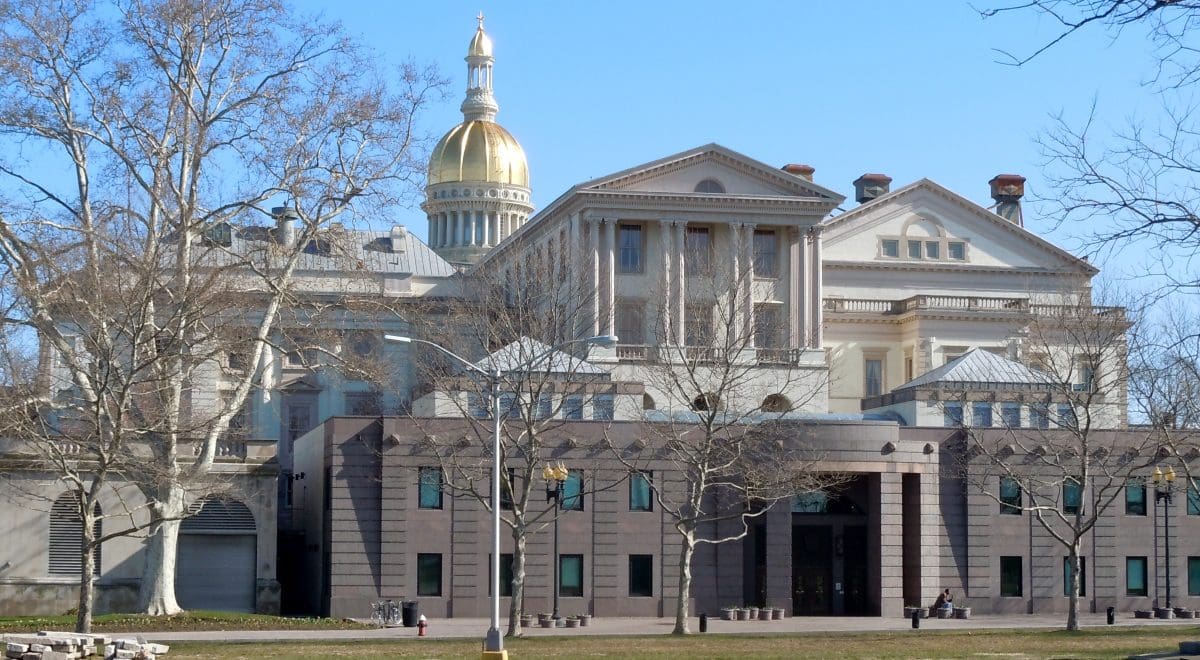[[{“value”:”
The NJ Assembly Agriculture Committee held an informational hearing on a bill for the Department of Agriculture instead of the NJ Cannabis Regulatory Commission (NJCRC) to regulate intoxicating hemp.
The bill A 5058 was introduced by Committee Chair William Spearman (D-5-Camden) and Assemblyman Robert Karabinchak (D-Middlesex-18). It would set up a regulated hemp park, including hemp drinks.
There are no other sponsors thus far. It also does not have the necessary State Senate companion version to become law eventually.
Beer and alcohol industry lobbyists and advocates were very eager to carve out intoxicating hemp-derived drinks being regulated by the Department of Agriculture. So, they were eager to criticize the NJ Cannabis Regulatory Commission (NJCRC).
Alcohol lobbyist Jeff Warsh said that because liquor companies are worth more, they would care more about losing their license. He said they would accept a tax on their intoxicating hemp drinks.
“We should treat it like alcohol,” Warsh argued.
Lobbyist Eric Orlando said he represented the NJ Brewers Guild agreed on the Department of Agriculture regulating hemp drinks. He said many out-of-state breweries are selling drinks, and they want a cut. Orlando said they could then make hemp drinks as part of their booze factories.
Lobbyist Eric Blomgren of the NJ Gas Station Association said their most scrupulous members don’t sell shady items that are lucrative. But then they’re annoyed they don’t make the money. He argued that figuring out testing is difficult. Blomgreen liked the bill that would help his members make money and the state get tax revenue.
Ryan Houge of the NJ Health Alternative Association said he owns a chain of 10 hemp stores. He also liked the bill.
“We support strong testing standards…,” he argued.
Leading cannabis advocate and attorney Bill Caruso noted that they passed a law on intoxicating hemp that Governor Phil Murphy then signed. But then the was a lawsuit. He was very unhappy that minors could access intoxicating hemp.
“We have failed to implement a law this body passed!” Caruso exclaimed.
He noted the legal NJ cannabis industry was supposed to include safety standards not accessible to minors.
“Congress has failed you here,” Caruso said. “…We don’t need to reinvent the wheel here.”
He argued that if the Farm Bill loophole is closed by Congress this year, it would be very complicated to deal with. Caruo explained that a regulatory system was created for the NJ cannabis industry, and this would be hurt greatly by the bill.
“Let’s not start over from scratch,” he declared.
Senior Compliance Director of the large Multi-State Operator (MSO), TerrAscend Evan Kolakowski, was against it too.
“Why would we undo what we have done?” he asked.
Kolakowski also thought it would be redundant versus the existing cannabis industry standards.
He also thought it would confuse consumers.
NJ Cannabis Trade Association (NJCTA) Executive Director Todd Johnson was also against the bill. He said most of the hemp was found to be legal. Johnson did not like the idea of a new regulatory structure being set up.
He defended the NJ Cannabis Regulatory Commission (NJCRC) regulating hemp.
Spearman asked Caruo why it was a problem to regulate it like alcohol.
“It’s not alcohol,” Caruso replied. “It’s created through a loophole in the Farm Bill … never intended for this intoxication.”
“You built a regulator that handles THC, not alcohol,” he added.
Caruso said it’s like Corn, which different agencies regulate depending on whether it is turned into a food product or whiskey. He argued that breweries could get NJCRC manufacturing licenses.
“Forgetting the tax was a bad idea,” Spearman joked.
Johnson said hemp products are chemically altered so people can get high.
“The liquor industry in general has no idea about THC,” he argued.
“Where should this product be sold then?” Assemblywoman Carmen Theresa Morales (D-34-Essex) asked.
“They should not be sold in convenience stores,” Caruso said. “We have CRC-controlled dispensaries.”
He said the CRC is slow, similar to other regulatory agencies.
Caruso said he did not oppose intoxicating hemp drinks sold at liquor stores. He thought it could be a unique type of NJCRC license.
Morales asked how challenging it would be for someone to get a New Jersey cannabis license.
“…It’s very difficult…,” Caruso said.
He said liquor stores would have many advantages a lot of cannabis entrepreneurs didn’t have that might make it easier.
“Would it be the same license with the same restrictions?” Morales asked. “The cannabis restrictions might not have the right flexibility.”
Caruso said minors can’t go to a dispensary the way they can enter liquor stores.
“I don’t think our cannabis system… has enough flexibility,” Morales argued.
There might not be enough flexibility because of red tape imposed by more seasoned politicians.
“Maybe our cannabis industry operates under too strict regulations,” Johnson argued. “All of these products are cannabis.”
He added that selling cannabis to minors gets a $500,000 fine from the NJCRC for a first offense.
“It is a very stringent system,” Johnson noted.
Trichome Analytical testing cannabis lab Chair Kristen Gooede said licensed hemp manufacturers will benefit from the bill overall. She thought it made sense to regulate hemp smoke shop retailers.
“By not passing this bill and allowing the CRC to regulate synthetic products, opens a backdoor to interstate THC commerce and undermines the entire adult-use cannabis industry,” she explained. “This bill prevents that from happening.”
Spearman said they were not aware of several issues raised.
Karabinchak said that after the hemp law was passed, and there was a lawsuit, it was confusing.
“The Department of Agriculture has handled hemp for many years before the creation of the CRC,” he noted.
Karabinchak defended his bill eliminating the NJCRC from hemp regulation.
“}]] Politics & Cannabis Policy Read More


